Theatre Reviews
ALICE IN WONDERLAND UNDERGROUND - Butterfly Theatre
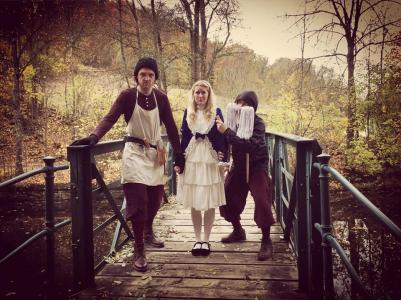
What would it have been like to follow Alice down the rabbit hole?
From the moment the Cheshire Cat ushered us into the mouth of the cavern, you could sense that we were in for a magical time. The children’s eyes were wide in anticipation as we filed through the limestone tunnel, a bit too leisurely for the Cat: “You hoomans are very slow!”
So began an enchanting hour and a quarter, as we followed a range of familiar characters from this Lewis Carroll classic through the labyrinth of stalactites and stalagmites. The Cheshire Cat, Tweedledee and Tweedledum, the Hatter, March Hare, Red Queen, the Walrus and the Carpenter all made an appearance, as well as Alice, of course.
The magnificent setting of Poole’s Cavern provided a stunning backdrop to the performance, with a wealth of platforms, crevices, chambers and rock faces from which the actors could draw the audience into the story unfolding before them. The cathedral-like caverns also created excellent acoustics and the Butterfly Theatre Company made best use of this natural phenomenon by including harmonious chanting and singing from the depths of the rocks. They also had us constantly on the lookout for the terrifying Jabberwocky.
This was a strong performance by all. Most of the actors had more than one character to play and did so seamlessly. In particular, credit goes to Charis King as the self-satisfied and conspiratorial Cheshire Cat, who provided a perfect guide as we meandered through the chambers to the next scene. The Duchess, played by Alexander Gray, was just one of the characters who had us all laughing, and watch out for a performance of Humpty Dumpty like no other! Bravo, Ed Hartland, who was also the writer!
In all, it was truly an evening in Wonderland!
Sian-Elin Flint-Freel
(Please note that the cavern can feel quite cold and it is sometimes wet underfoot so come prepared.)
AND THE ROPE STILL TUGGING HER FEET - Caroline Burns Cooke/Face to Face Theatre
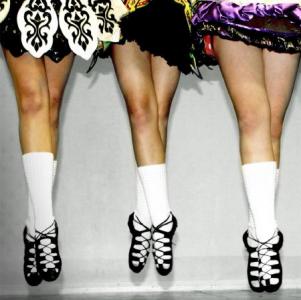
This powerful one-woman drama begins with a clap of thunder, and a black-clad woman, crawling through the rain, clearly in pain and distress. It’s a very strong wake-up call to the audience, and the beginning of an impressive piece of theatre.
Actor Caroline Burns Cooke draws on the facts of the Kerry Babies Scandal of 1984, when a young woman was accused of killing two babies, one of which was not even hers. She creates a vivid portrait of a time, not so long ago, when Irish society was so dominated by men and Catholicism to a degree where a naïve and romantic girl could be accused of the most appalling crimes simply by becoming pregnant.
As Leeane, Caroline Burns Cooke vividly and compassionately brings this young woman to life in a performance that’s deeply affecting. She also portrays other characters: her predatory, married lover, the country policeman who arrested her, the Northern Irish nun whose sex education was so woefully inadequate, and a ‘radical lesbian feminist’ who commentates on the events with the benefit of hindsight. Some of the transitions between these characters could be more seamless, and the different figures occasionally become muddled (at least in this audience member’s mind), but this doesn’t take away from the overall effect.
This is a powerful and striking play, oozing with empathy, that clearly had a great effect on its audience. It’s also a reminder of how far we have come in terms of women’s reproductive rights, but also how far we still have to go.
Robbie Carnegie
ANGEL TO VAMPIRE! - Nigel Osner
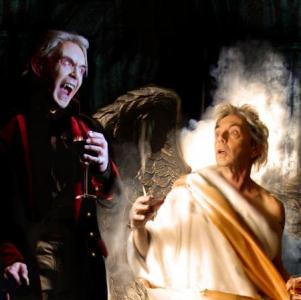
If there was a Fringe "Cabaret" category then it would be appropriate for Nigel Osner's "Angel to Vampire!" show. Nigel simultaneously tells the audience about his life while performing a series of bitter-sweet comic songs and recitations in the style of Victoria Wood. Each one is a fully formed character vignette which introduces us to the person and their story complete with costume, accent and physical presence.
Some of Nigel's characters are fantasy ones such as the Irish Angel or the Romanian Vampire of the show title. However many of the characters are ordinary people looking for love and relationships such as in "He's really very useful blues" and "I'd like to have a love affair" or making defiant statements as in "Don't label me" and "Seize the day".
Nigel's show is well honed from his years as a Cabaret artist and his sweet and funny characters will stay with you afterwards like old friends.
Alex Watts
BEEREY - Lois Temel

Written, directed and performed by Lois Temel, this one woman show tells the true story of the ‘Freshwater Five’.
In 2011 five men were convicted and sentenced to a total of 104 years for smuggling cocaine off the English channel on their fishing boat. Since incarceration a wealth of evidence to the contrary has emerged and the appeal for their release continues to this day.
Imagine you have just popped around for a cuppa, this story is told through the eyes of prisoner Jon Beere’s daughter Elle, where we learn the full extent of this miscarriage of justice from the perspective of their loved ones and the effect a 24 year sentence has on all their lives. Candid personal accounts of the shame, prison visits and phone calls home are interspersed with BBC documentary clips to provide a good balance of emotional dialogue and factual content.
Lois (Elle) grabs the audiences’ attention immediately with a convincingly poignant and moving performance, along with optimistic lighter moments which stop the play feeling too heavy, despite the theme.
You come away realising how little consideration is given to the families left behind and it sets the seed of wondering how common these cases of wrongful conviction might actually be in our society.
Find out more about the Freshwater Five case at youtube/a4ZyAmnnFp4
Karen Wain-Pimlott
BEING JULIE ANDREWS/CAT GOT MY TONGUE/BONEMILL - fishhouse theatre
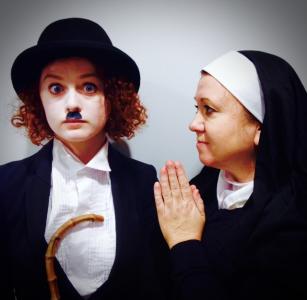
Last year fishhouse brought “Cloaks” to Buxton and, in something of a surprise package, delighted everyone leaving audiences in tears of joy and sadness. The question on our lips was “Can they repeat that?”
This year they bring three pieces and if you saw and loved “Cloaks” then “Being Julie Andrews” may be the place to start. Written and acted by Lesley Emery it is “basically autobiographical” which makes her performance all the more astonishing. I won't say much about it because I don't want to spoil it for you. Lesley tells of episodes in her life as a daughter, wife, mother and career professional. There have been times when Lesley has found the songs of Julie Andrews - especially in “The Sound of Music” - a source of hope and consolation.
Lesley also acts - with Kirsty Mealing - in “Bonemill”, written by Alison Dunne. Set in 1983 Vi (Lesley) is living alone. She works with her hands rather than her brain (though she is good with numbers). Her paid work is at the local meat processing and rendering plant - which dominates the town she lives in. At home she is making curtains. Her life changes when her niece Riley is sent to stay with her. Riley is a difficult child, reluctant to talk to her aunt. She is a vegetarian and loves Morrissey. She reads endlessly, seldom going out. Slowly the two find common ground.
The final piece is very different from anything else that I have seen from fishhouse. Kirsten Mealing’s “Cat Got My Tongue” is a solo piece of mime/clowning and is just 30 minutes long. A young woman is in a bar; there is plenty of chat going on but it is obvious that she struggles to cope or join in. She has some sort of anxiety complex. She disappears under a table and resurfaces looking like Charlie Chaplin and gradually tries to create a relationship (albeit imaginary).
fishhouse are in their second year “and our mission is to make work by and about women.” In this they succeed brilliantly - but men need to see their work too!
Keith Savage
BETHNAL GREEN - Lucky Dog Theatre Productions

This production tells the story of the Bethnal Green deep shelter tragedy which happened on 3rd of March 1943. It was the worst civilian disaster of WW2 and the country as a whole knew nothing about it at the time.
The way the audience was brought into the room was an excellent device to set the mood and atmosphere. From the moment we entered through the door we got a sense of what it was like in those shelters.
The story is told mainly through survivor testimony. Tony Carpenter and Philip Hutchinson play the ARP wardens and every other character in the play. Through a change of hat or addition of a scarf the characters tell their personal stories of what happened on that dreadful night.
To start the two performers stumbled on lines and looked unconfident. The light changing between actors was an unnecessary irritation (the lighting concept would have worked better if there had been a tight spot). I also feel the multi-role playing could have been much stronger in places. However, none of that really mattered when the story unfolded, and by the time Tony Carpenter was telling the nurse’s story all that really mattered was hearing what the next person had to say. It was heart-breaking stuff.
I think that a modern audience will naturally draw parallels to the Hillsborough disaster and the injuries inflicted there. The testimonies of the Bethnal Green survivors are chillingly similar to those statements given in court by the survivors of the football tragedy when talking about how those around them died.
This is an interesting and powerful story that offers a chilling insight into the events of 3rd March 1943, and of how a Government acted in a time of crisis for the good of the nation as a whole.
Jayne Marling
BOUNCERS by John Godber - Sudden Impulse Theatre Company

Sudden Impulse did not disappoint with this slick version of John Godber’s famous play. Bouncers tells the story of the lads and lasses on a Saturday night out and the bouncers who are there to keep the peace. The audience were roaring with laughter as the four actors swiftly changed between characters and scenes.
The rapid pace of the play sees the characters move from hairdressers to barbers, to the pub, to the club, the video shop with no more than four blue plastic chairs to help. The physical and vocal skill of Richard Shields, Rob Hiatt, Phil Malkin and Craig Spencer was clear to see and the hours they must have put in to get their timings so spot on is commendable.
Godber uses many dramatic devices to tell his story of young people out on the town. Direct address makes the audience really listen to what is being said, especially in Lucky Eric’s speeches. Richard Shields played an imposing Lucky Eric delivering his speeches with a believable intensity.
The director also added in lip syncing and some excellent slow motion to highlight the similarities between man and beast, a recurring theme.
I would question the suits; if the play has modern references then the image of the Bouncers should be more of the smart doormen we see today and not the ill-fitting suited Bouncers of the 80s where the play was originally set. However a small quibble in an otherwise excellent piece.
Go and see Bouncers for a thoroughly entertaining evening, but book your ticket now it will sell out!!!
Jayne Marling
CALL MR ROBESON - Grist To The Mill Productions Ltd

The set in the Rotunda Theatre was unusual. It contained an interesting display of flags, books, and wooden boxes around a piano keyboard, where the talented musician, Tim Mottershead tinkled the ivories, softly playing some of the Negro spirituals that had become the trademark of Paul Robeson, the man with the evocative deep bass singing voice.
The production was both written and performed by Tayo Oluko. His act was incredible, one could almost believe that this was a reincarnation of Paul Robeson although he was of Nigerian origin and now lives in Liverpool. He had adopted a believable American accent. His transition from the spoken word to emotional song, must have summoned up well remembered memories in the audience of 30, the majority of whom were of an age to remember the popular deep bass renditions of “Old man river”, “Swing low sweet chariot” and “Steal away to Jesus” among others, the latter being a coded message for oppressed Negroes to escape from the confines of their current existence.
The theme of the play was mainly Robeson’s fight against apartheid. His family had struggled with hardship and had the determination to rise above it. He undertook to carry on this ambition and confronted the issue in both America and beyond. One of the other countries that he visited was Russia, which turned out to be almost his downfall during the McCarthyism era which made accusations of Communist leanings, which in some cases, had not a shred of evidence.
Not only were the acoustics in the unconventional rotunda theatre so effective, but also, the background sound effects, which simulated gunfire, chanting crowds and at one stage, the effective clattering of a helicopter, which appeared to circle the actor and audience in a threatening, oscillating manner.
I found this one-man production amazing for its realistic portrayal of such a motivated and talented man as Robeson, who was driven by his mission to rid the world of apartheid. He would have been so proud if he had lived to see Barack Obama as President of the United States. That was his dream.
Thank you Tayo Aluko for a production to remember. I recommend those who weren’t fortunate enough to witness last night’s performance, to take up the chance to attend on either Friday or Sunday night again at the Rotunda theatre.
Jackie Corrigan
EDISON - Static Assembly

Thomas Edison? Invented the light bulb, right? Nikola Tesla? Not sure - AC guy?
Thomas Edison was a great industrialist and entrepreneur. A self-promoter par excellence who recognised the potential in scientific discoveries - not all of which were his own.
Nikola Tesla was born a Serb, had a prodigious memory and was the archetypal “mad scientist”. In his late 20s he moved to Paris and then to the US to work for the Edison Corporation. He didn't work for them for long and may have met Edison just a couple of times.
In recent years there has been a lot of debate and controversy over quite how much Edison stole from Tesla and others. No doubt the story is a complex one but of all Edison’s patents the lightbulb is the only really enduring one. Tesla’s work is more original and at a theoretical level is more significant.
It is impossible to see anything that comments on American capitalism without the lens of Trumpism focusing the view - and in this production Edison’s blonde wig encourages that perspective.
We are lucky to have Static Assemby from Philadelphia with us as part of their European tour. They have been to Prague and will be in Edinburgh in August. This is exactly the sort of show that Fringes exist for. Writer Joshua Logan Walker eschews linear narrative adopting a game show format in which Edison uses his power, wealth and authority to undermine and overwhelm a sickly immigrant who has a passion for pigeons.
With a cast of 10 this is a big, bold and ambitious show and there is just one more performance.
Keith Savage
THE EMPRESS AND ME - Grist To The Mill Productions Ltd

There are many one man or one woman shows at this year’s fringe but only one set in 19th and 20th century China. An exotic setting brought to our Derbyshire town.
We are treated to the true story of Lizzie Yu, a mixed race girl who was brought up in France but when her Chinese diplomat father was recalled to China finds herself invited to ‘court’ in the forbidden city serving a dominant Empress Cixi.
The show is well told during dressing and costume changes as Lizzie slips between the role of lady in waiting to a performer recounting her life. This became a little confusing as the show started with the account of life in China in full traditional dress and then soon switched to small town USA (Twin Falls, Idaho) where we discover Lizzie was recounting her experience of having just presented her story to an audience. At first it seemed that we were the audience in question but this possibly interesting dramatic structure was not developed.
In many ways this remarkable story of a mixed race girl who became an ‘Empress’s Pet’ is well worth a hearing but after half an hour’s gossip about court politics this reviewer was eager for more substance – which was promised when the Japan/China war and the ‘Boxer rebellion’ were mentioned but both of these were soon passed over and not explored in any depth.
An interesting point made was that at this time Queen Victoria was on the throne of the Britain and the empire and between her majesty and Empress Cixi two women controlled half the world but women as a whole benefitted not at all, Queen Victoria, remember, dismissed the women’s suffrage movement as unnecessary.
Later in Lizzie’s life as she was preparing her stage presentation Lizzie apparently met Sarah Bernhardt as she was learning to act and ‘gushed out her entire life story in two minutes’. This was developed into an hour as presented in the Rotunda.
The Rotunda is a welcome addition to fringe venues except that on this warm evening (it does happen occasionally in Buxton) the venue was a bit hot and stuffy.
A couple of lighting and music cues were fluffed and hopefully these will be ironed out by the next performances on 19th, 20th and 21st July.
Brian Kirman
THE FORGOTTEN TALES - Parable Arts
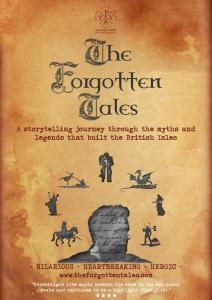
A cosy full house of twelve people on the first floor of Scrivener's was enthralled and amused by Jon Buckeridge's storytelling. Jon is passionate about the English folk stories which he collects. But much more than this, he energetically animates the stories in his performance by acting each character with individual voices , accents and great physicality. Whether the character is an eleven year old boy, a warrior, a king, a nagging mother, an ugly but kind fairy, a flirty young girl, a foppish son or the devil, Jon's performance is riveting and hilarious.
Jon tells a different set of stories in each performance and this evening we were treated to the following. The story from Wales of Dai and his cow on the cursed bridge; The Irish story of how the hero Cuchulain got his name; The story of how Pignut transformed from a feckless young peasant girl into a kind and wise queen; and the story of John Northrop and the Barnsley boar.
Jon's passion for these stories and his ability to embellish them and bring them to life gives the impression that he could become a sort of Cecil Sharpe of folk tales. The audience tonight was all adult and these stories are not designed for children although I am sure they would enjoy the performance. It is a very long time since anyone has told me fairy stories but I could happily listen to Jon perform his stories every night. When is the DVD coming out Jon?
You can get an impression of Jon's performance in the video at the Parable Arts web site http://theforgottentales.com/ and you can follow him on various social media sites using the tag "parablearts". Scriveners is a very small venue and I recommend that you don't miss Jon's second and last Fringe performance on Friday 14th July if you can get a ticket. Please come back next year Jon in a larger venue or for more performances.
Alex Watts
GRATIANO - Grist To The Mill Productions Ltd

Like the author's other play in the Fringe festival (The Unknown Soldier), this play revises a well known story and creates an alternative truth for its characters. In this case the play imagines what might have happened to Shakespeare's characters a year or two after the events of the Merchant of Venice if the period of the play was transposed to 1930s Italy with all its socio political implications.
The play opens with Gratiano in a police interrogation room. He has been arrested for the suspected murder of Bassanio. In this 1930s world Gratiano is at best a beer swilling reactionary wide-boy and at worst one of Mussolini's black shirts. He denies the murder but, then, he would say that wouldn't he.
Gratiano reminisces about the events described in the Merchant of Venice as well as imagined events occurring after the play. He expresses his prejudice regarding the effeminate behaviour of Antonio and Bassanio partly driven by his jealosy that success and priviledge comes so easily to Bassanio. He describes his involvement in the inevitable fate of Shylock in 1930s Italy when he is loaded onto a truck with the other jews. But he also shows genuine regret when years later he is shown a film of the concentration camps. He is aware of his bigotry but justifies it with the phrase that he "would rather be bathed by bitter rhetoric than be washed by the truth".
This is another one man play by writeractor Ross Ericson. The acting is again of a high standard. Ross certainly brings the 1930's Gratiano to life. The script nods to the structure of Shakepeare's writing. I am not sure whether this is just a homage and comment on Shakespeare's play or whether the author is trying to make a wider socio-political point. Everyone will take away their own message from this hard hitting play.
Alex Watts
HATS OFF TO LAUREL AND HARDY - Lucky Dog Theatre Productions
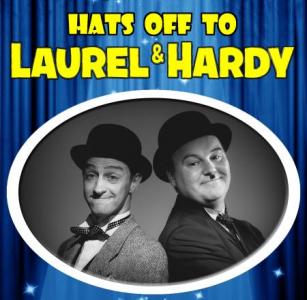
This show was warmly received last year and you can see why. Stan Laurel and Oliver Hardy are remembered with affection - even by those who have seen few of their films and know them through just a handful of images or catchphrases. This show is a straightforward narrative biography and we learn something of their origins, how they met and their careers developed; we are told about their marriages, health problems and high points and low points in their professional and personal lives.
Naturally we get to see and hear some of their gags and routines - some done live in front of us and others recreated on black and white film. Even though we know what is going to happen we still laugh - and you imagine that for as long as there is an audience the laughs will continue because this humour is timeless.
If there are secrets to their success one is about timing - and with Laurel and Hardy it is as much about holding on just a fraction of a second so that the value of the payoff is multiplied because we have had to wait that moment. The other trick is that no matter how Stan and Ollie treat each other, no matter what they say to one another we know that they are the greatest of pals, they are inseparable. Their love for each other makes us love them too.
This love inevitably led to the profoundest sense of loss when Oliver Hardy died; in a way Stan died then because he depended so much on Ollie. It was as though they were a single person. This pathos was very well played out in the show which in other less sensitive hands would simply have plundered the comedy routines.
You would have to have a heart of stone not to be moved by Hats Off to Laurel and Hardy.
Keith Savage
INDISCRETION - Wild Wolfe Productions

Maggie (Lexi Wolfe) is waiting for a visitor. No ordinary visitor though judging by the way she keeps checking her hair, her clothes, the clock and the phone. So when the wrong visitor rings the bell, we are frustrated when Roger (Andrew Slade) arrives, glancing around suspiciously, missing nothing; who then systematically questions her about just about everything: her absence from the dance, from work, even her tidy house. This intrusion fills the audience with an element of anger; how dare he… who does he think he is… let her get on with her life… but then the truth of the secret liaison starts to emerge.
Set in the Blitz this play reveals the despair that Maggie feels about her life and her desire for love and security that she can see in others. Wolfe skilfully takes you through the highs and lows of an emotional Maggie who realises that she has been blinded by the anticipation of happiness with an unsuitable man. Her relationship with Roger is complex. Obviously an old friend but are his intentions really to protect her from this man or from all men – an uncomfortable spell in the Anderson shelter allows these feelings to bubble to the surface.
Both actors are superb in allowing you to connect with the issues raised and question the relationship between them. Very well written as the awfulness of the bombing raid is balanced with quips about whether there will be a building for them to work in the next day with a noticeable lack of any further views on the future. Fantastic acting that completely immerse you in the characters portrayed; minimal props, just your imagination and emotions.
The audience were also similarly captivated and one comment was that they hot footed it over to see it having enjoyed Mrs Oscar Wilde so much (also featuring Lexi Wolfe). They were not disappointed.
Highly recommended. Excellent acting which will keep you absorbed from start to finish.
Sandra Cooper
JEU JEU LA FOILLE'S FRONTAL LOBOTOMY - Jeu Jeu la Foille
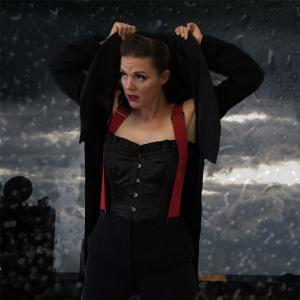
Jeu Jeu La Foille presented a master class in how to perform a one woman show. On her website she describes herself as Burlesque Maverick but she is much more than that. For one thing she is also a performance poet. Frontal Lobotomy is as much about the words and the jokes as it is about the visuals.
The play gyrates around the story of Walter Jackson Freeman II who invented the Trans orbital Lobotomy. This is a ten minute operation which, at its peak in 1949, was inflicted on 5000 people with common psychological disorders such as anxiety and depression. It often had the effect of permanent personality change. This is the weird science part of the show and provides plenty of opportunity for Ms La Foille to demonstrate her finesse with black humour. But this is not an ordinary science lesson. Among many other things in the show we were taken on a journey to meet Tom Waits.... and his band , a magic show with electric lights appearing and disappearing in and out of various orifices, how to write a Brain Haiku and a tour of the seedier side of dreams.
Jeu Jeu La Foille is a riveting performer. The rhythm and rhyme of her language and her surreal images and jokes come thick and fast. The show's spectacles are both surprising and memorable moving from a white coated scientist to wearing her stage set while she examines the audience in a mirror followed by a series of onstage costume changes and props.
The show is very satisfying sensually, visually and intellectually. It is great to see a performer who turns you into a fan where you want to discover their back catalogue and follow what they are going to do next. She has a website www.jeujeulafoille.com or you can follow her on social media.
Alex Watts
JUST AN ORDINARY LAWYER - Grist To The Mill Productions Ltd

I don’t really like cricket. If I’m honest, I don’t much care for lawyers. Bear with me, see where I’m going with this.
Just An Ordinary Lawyer is the story of Tunji Sowande who arrived in London from Nigeria in 1945 to become the first black head of the Chambers and the first black judge in Britain. I know, but it’s a lot better than that sounds. There is a lot of politics, and the way it intermingles with sport becomes fascinating during the course of this 90 minute (mostly) one man show.
The show is written, acted and occasionally sung in a deep baritone by Tayo Aluko, with (too infrequent) piano accompaniment from the excellent Tim Mottershead. At first there are too many sporting references for this cricket-illiterate reviewer – do I really care about the Oval in 1968? - but soon the political backdrop of the late 60’s raises its not always pleasant head – there are references to the Nigerian civil war, colour bars, apartheid, and to Biko. As the play progresses, we see the subtle, at times insidious relationship between sport and the politics of the time, for example with the farce surrounding Basil d’Oliveira finding a way to eventually ply his trade in South Africa and, in case that is too much cricket for you, the human rights salute given by the 200m medallists at the podium of the 1968 Olympics, highlighting the shame of the USA, a country, we are told, founded on cruelty.
The sense of time (by which I mean the 60s) is keenly depicted throughout, as indeed is the political landscape and sporting detail. Aluko carries this long one-man show off to excellent effect, and is at his best when changing voices – he is a more than convincing pompous member of the cricketing and legal establishment, an instantly dislikeable Edgar Mappin, and there is an unpleasant hint of B.J. Vorster. I would like to have heard more of his various voices and accents, as he delivers theses with great aplomb.
The set is minimalist, with sparse black and white lighting and some props, including an intriguing armoire which is hardly ever used, and the same can be said of the sporting-related sounds. I would also have been in favour of more musical intervention – Aluko’s baritone is put to good if somewhat sparse use and Mottershead at times seems a rather disengaged figure whose considerable talents could have been exploited more.
The play is very well-written with some subtle touches, and I felt improves towards the end. There are moments of poignant sadness but also humour in Aluko’s delivery. It is long for what is essentially a one-man show, but I recommend it to you. It runs until the 16th July at the Rotunda (check your programme for last day time changes!) and the really good news is…you don’t have to like cricket!
Ian Hamilton
KING LEAR (ALONE) - inamoment theatre company
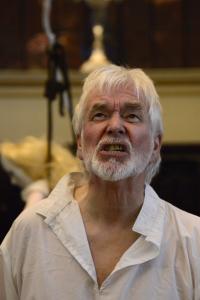
For such a large festival Buxton is surprisingly light on Shakespeare. Often festivals feature innovative adaptations of the Bard’s works and these balance the stand up shows, improv and general frivolity. Partly redressing this is ‘King Lear (alone)’ written by Frank Bramwell – and of course that Shakespeare bloke.
The title of the show could be misunderstood, it is not an attempt at one man telling the whole drama of King Lear playing multiple parts. Instead Rob Young plays the King finding himself betrayed by his daughters Regan and Goneril and grieving for Cordelia’s death for which he blames himself and so he is literally alone.
Using selected text, not always in the sequence of the play, the descent into madness of Lear is vividly illustrated.
The venue, United Reform Church suffers from being out of the town centre and away from the ‘festival buzz’ but is an interesting venue with the chapel setting giving good acoustics which are well suited to the strong powerful voice of Rob Young. As Lear he also softens and shows tenderness particularly when lamenting the death of Cordelia and his love, her mother, Imogen.
The ‘writer’, Frank Bramwell, ends the show in a surprising way after the turmoil of Lear’s mad ranting and gives insight into one of Shakespeare’s most enduring tragedies.
There are two more performances on Friday 14th 8pm, and Saturday 15th 3pm.
Brian Kirman
LABELS - Worklight Theatre

We are all defined by labels, but in multi-cultural Britain, some of these labels take on a sinister tone. In this autobiographical work, actor Joe Sellman-Leava delves back into his family’s history to explore the prismatic nature of identity and how simple labels (whether well-intentioned or not) can never do us justice. On an empty stage, Joe, with only a large case for company, and sheets of stickers which he gradually sticks on himself as the evening progresses finds an entirely fresh way of exploring the subject of race, of immigration and of refugees and also the potential traps inherent in labelling ourselves and those around us. As well as his personal reminiscences and those of his family, Joe also uncannily captures less welcome voices: Enoch Powell, Nigel Farage, Katie Hopkins and others, voices that shout the loudest while the reasonable, warm tones that Paul represents are often ignored. The audience was generally more mature than would appreciate his 90s video game references, but this is a personal, warm, well-constructed play, which genuinely makes you think about the way you categorise people, performed with disarming skill by the multi-talented Sellman-Leava.
Robbie Carnegie
LACE CURTAIN IRISH - Joanna Lavelle
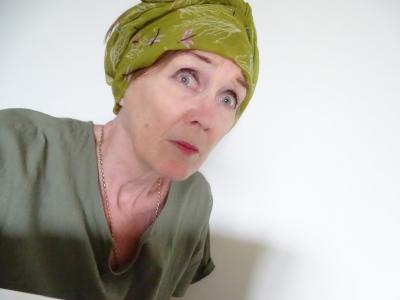
This consists of two short pieces, beautifully delivered by Joanna Lavelle, about – as the overall title implies – secrets that can lie behind the realities of life.
The first, “Crossing the Line”, new writing by Michael Sheath, is about the exposure of a dark family secret. In style, it is reminiscent of Talking Heads, a monologue delivered seated. It tells how, from the unexpected police knock on the door in the early morning, a wife and mother finds out that her husband has for years been hiding his own dark secret from her and maybe from the young children. We hear vividly and convincingly just what happened next – not to the guilty man, but to her and the children: how she felt and reacted, about the emotions she went through, the truths she had to face, how she came to terms with it all, and the twist that came at the end.
It is delivered face on, direct to audience: reflective, warm and yet chilling, conversational, and with impeccable pace. A real winner.
The second is “Lace Curtains Irish”, by the American writer Carolyn Gage. Well-received in the US, this is the first UK production. It’s about the Lizzie Borden case, the 1892 murder with an axe of her father and her mother. We have the narrative from the point of view, the memories, of Bridget, the family’s young, over-worked and stressed Irish servant. Sparked off by a newspaper obituary about Lizzie Borden, years later, Bridget recalls her life with the family, the conditions, the warm but uneasy relationship between her and Lizzie, the sheer horror of seeing the blood pouring from the father’s head – the first violent blow seems to have killed him, but 10 more were made – and how she was ‘paid off’ to go back to Ireland but then returned. Over time she has hidden the events from herself, but as she narrates it all, the suppressed memories come back and make her – and us as audience – doubt what actually happened on that dreadful day. Or at least wonder where that doubt comes from.
In this second play, Joanna Lavelle sits at times, but moves around the stage to engage with limited but critical props which lead her towards the recognition of haunting memories.
In both plays, she engages sensitively with the audience, engaging our rapt attention as the realities (or apparent realities) unfold towards the twist at the end. These plays make a fine way to spend a rewarding hour. Recommended.
Michael Quine
THE LADDER by Helen Rutter - Helen Rutter

The Ladder is a story of everywoman. Her loves , frustrations, happiness, sadness and contradictions. It is the story of being a mum and a wife who has lost her identity and has become invisible and taken for granted but who also knows deep down that she is loved and cherished.
The play opens with Helen in pain at the top of a ladder because her finger has become stuck in the ladder mechanism while painting a room. What is worse is that there is a serious risk that the emergency services will discover that she is wearing Minnie Mouse pyjamas. Helen takes us with her through a series of comic set pieces starting with why she is alone at the top of the ladder doing the decorating, through the importance of losing a finger relative to other events in her life and ending with the absurdity of the emergency services when they eventually turn up to release her. Helen is forced to re-evaluate who she is and her relationship with her husband, children and family past and present. In the end things don't appear to have changed very much because she is still painting the same room. In fact they have actually changed in fundamental ways and she has rediscovered who she is, has become less invisible and more confident at expressing herself.
The writing is excellent and Helen Rutter is brilliant at physical comedy which is shown to great effect by the device of expressing all emotions and humour while in great pain at the top of a ladder. She tells her story through everyday situations and feelings which are simultaneously familiar, hilarious, ridiculous and poignant. Helen takes the audience with her on a roller-coaster of emotions and wins them over with raw honesty and some great jokes.
Alex Watts
LORD OF THE FLIES - REC Youth Theatre

The award-winning REC Youth Theatre’s Senior Company is back with another very assured, slickly delivered piece of theatre, a satisfying adaptation by Nigel Williams of William Golding’s dark novel about children descending into savagery on a desert island.
The three leads in this production are particularly convincing. Alex Paul as Ralph and James Chetwood as Jack both manage to convey their characters’ different journeys - Ralph from confident figure of authority to timorous wreck and Jack from priggish choir prefect to feral hunter of both beasts and humans. Victimised, bespectacled Piggy, played by Ben Edmonds, is a more consistent figure but this too is a challenging role, particularly as Edmonds does not carry the extra weight normally associated with this part. As it is, he cleverly uses body language to express Piggy’s immense frustration at being continually sidelined and mocked despite his intelligence and maturity.
This is not a very easy play to stage but the production team under director Kitty Randle have come up with some neat ideas to suggest fire and also the apparition of “the beast” which is to haunt and derail the islanders. Unnerving music also proves effective in this regard and the performers are well choreographed as their hunting becomes increasingly ritualistic. The REC regularly holds workshops in stage combat and this has clearly paid off with fight scenes that could have been embarrassing proving quite disturbingly convincing.
As with the REC’s Mobile Phone Show, also on at the Fringe, there is some lovely teamwork on display here with those in smaller roles contributing to the success of the whole. I was struck by Anna Walker’s portrayal of someone trying to hold it together but quietly terrified by what was going on and what she was becoming, and by Michael Duckworth as the epileptic Simon but there were no weak links and crucially great commitment from everyone involved.
Anyone inspired to join one of REC’s three companies for young people should contact artistic director Kitty Randle on recyouththeatre@gmail.com
Stephanie Billen
THE MARRIAGE OF KIM K - Leoe & Hyde

The Marriage of Kim K is a full blown musical with a 7 piece orchestra, 6 actorsingers and 14 original songs plus 4 songs taken from the Marriage of Figaro. It is a high quality production that is currently headed for the Edinburgh Festival but could well go further than that. It is also a very clever, sophisticated, original and enjoyable piece of musical theatre.
The story and music revolve around three couples working through relationship difficulties. These are Kim Kardashian and her husband Kris; a young professional couple Amelia and Stephen and the Count and Countess from the Marriage of Figaro. Amelia and Stephen are stressed out by their careers and arguing about what to watch on TV. Amelia wants to escape from her job as a lawyer by watching Kim Kardashian while Stephen, a struggling composer, wants to watch the Marriage of Figaro for inspiration. Despite initially thinking that these are very different types of entertainment, they begin to realise that there are a lot of similarities between the two dramas.
The stage is split into three sections with Stephen and Amelia in the middle and the other two couples on either side. As Stephen and Amelia's relationship begins to break down , the relationships of the other couples do so as well and begin to reflect what is happening with Stephen and Amelia. The action and music segues between the couples in ways that is always well done and often very witty. Both the musical composition and the theatrical production are excellent and the acting and singing of all the performers is faultless.
This review cannot properly do justice to the theatrical and musical richness of the production. It is one of those shows that takes you by surprise and makes you want to go back to see it again in order to appreciate it properly. This is possibly the unmissable event at the 2017 Buxton Fringe.
I spent some time during the performance trying to work out the names of the original songs. To save you the trouble here they are for you to refer to (not quite in order).
2gether 4eva
Make up tutorial
+Chill
Mozzart
Play it Cool
Work vs Play
Kim
Shut Up
Domestic
Kanye's coming
Life is
Unhappy
Live Moves on
Echo Chamber
Alex Watts
A MIDSUMMER NIGHT'S DREAM - Black Box Theatre Company
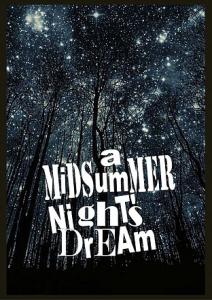
In recent years we have seen the ‘Dream’ performed in Poole’s Cavern and this year we have it in the Rotunda. It’s a festival favourite around the country and never fails to entertain. The first performance began while the Morris troops danced and banged outside either side of the tent which could have been off-putting for both performers and audience but after a minute or two the cast gained confidence and ‘got stuck in’.
The director, Anne-Louise Fortune, presented a bare stage and the cast were dressed minimally in black – a contrast to the flamboyant Morris dancers outside. The time setting was contemporary (Oberon begins the play speaking his lines into a mobile phone) and with two male actors and four female there was cross-gendering of parts. Since in this play falling in love and swapping allegiances (even with an ass) is a strong theme and in our present society it is of little consequence whether the lovers are same sex or otherwise although a nominal attempt to differentiate is made by male characters wearing hats and female flowers.
The difficulty in this play – especially an edited down version - is getting the right balance between the three levels: mechanicals, fairies and nobles. The enthusiastic cast does this well and as the play progresses the farcical nature of the plot becomes apparent as the action become more physical; Samuel Topper for example throws himself about the stage recklessly.
The Black Box company is from Stoke on Trent and pleasingly there was no attempt to hide the northern accents and flat vowels although there were moments when some actors rushed at their lines or were a bit ‘breathy’ preventing a clear hearing. It is when we have the play within a play ‘Pyramus and Thisbe’ put on by the ‘mechanicals’ to celebrate the wedding of the Duke and Queen (played by Zar Damani and Nici Preston): that the actors clearly start to enjoy themselves. Jessica Buckley as Quince directs the play within a play and this is her most comfortable role and Natasha Nunan shows non-verbal comic skill playing the wall. If there is a star in this play it is surely Bottom and Charlotte Broadbent doesn’t so much make a meal of the role but an entire five course dinner plus extra pudding. The audience loved it. Any hesitation the company had early in the performance disappears and the audience is well entertained by the play within the play (the actual audience as well as the Duke and Queen).
Lighting is used to emphasise the fairy scenes and helps create the ‘Dream past the wit of man’.
Brian Kirman
THE MOBILE PHONE SHOW - REC Youth Theatre

Jim Cartwright, the esteemed playwright behind Road and Two, wrote this witty, thought-provoking ensemble play in 2013, its first performance being at the National Theatre. It proves an excellent choice for the 20 plus members of the REC Youth Theatre’s junior companies including some of the group’s younger children.
There is no central plot but we meet a good many young phone users, from the trio trying to work out the best mobile deal from a baffling array of alternatives, to the girl faking a better life for herself on Facebook. “Anyone can be anyone on social media” was a phrase which could be taken in a number of ways, some positive, some sinister. There was also the “phoner loner”, particularly well played by Daniel Walton, who felt “nondescript” when his mother wouldn’t let him have a phone “because of the radiation”, and another boy who was made utterly distraught by the loss of his phone, wailing: “I’ve been off for an hour; they’ll think I died!”
A poignant scene found a brother and sister texting, and seemingly getting replies from, their dead mother. We saw how mobiles can bring a group together but also how they can foster miscommunication and get in the way of actual conversation between people sitting right next to each other.
With punchy music, the piece was extremely well choreographed by director Kitty Randle and associate directors Sam Grogan and Clare O’Neill. The energetic cast worked superbly as a team and acted with conviction though there were a few places where a little more rehearsal might have avoided some forgotten lines - no doubt nothing that cannot be fixed by the company’s next performances (tonight July 12) and July 19.
This is probably the one show in the Fringe that asks you to leave your mobile ON - a signal that this play is not just about “the young” but about all of us and our relationship with the ubiquitous smartphone. The award-winning REC deserves to be seen by more people than the parents of the cast so do give it a go and look out too for the REC’s other production, Lord of the Flies, later on in the Fringe.
Stephanie Billen
MRS OSCAR WILDE - Lexi Wolfe

Lexi Wolfe gives a wholly convincing performance as Constance Wilde holding the audience’s attention without a moment’s lapse right from her first words. She clearly has empathy with her character who arguably suffered most from Oscar’s downfall.
The story of Oscar Wilde is well known and has been the subject of films and books but who knows anything at all about his wife Constance? In fact there are many who, knowing him as homosexual, don’t know he had a wife and two sons.
Lexi Wolfe has researched the life of Constance Wilde and produced a show based on her letters to her brother Otho. The letters reveal a young woman envious of her brother’s access to university education and flattered by the attention of a man of such abilities as Oscar. Until then, we learn, she despaired of finding a man her equal in intellect and wit.
The show follows Constance’s revealed emotions as her blissful marriage changes with the birth of her second son and Oscar spends more and more time away from her. She feels a mother’s guilt and blames herself for not quite loving the second son as much as she did the first. We are taken through the effect of Oscar’s obscenity trial on Constance rather than the trial itself, which is already well documented.
Constance is revealed to be a highly intelligent feminist, campaigning for the election of Britain’s first ever female MP and talented enough to produce her own written works but in reviewing her legacy as her health deteriorates and with foreknowledge of her premature death (at 39) she realises she will not be known for her own work or even for her children but merely as ‘Mrs Oscar Wilde’.
Lexi Wolfe is a formidable actor who has won a number of awards. She will be strong contender for ‘best actress’ not only in this Buxton Festival but any festivals she attends in the future.
There are only two more performances – July 11th and 19th so book early to avoid missing a very special show.
Brian Kirman
MRS ROOSEVELT FLIES TO LONDON - Hint of Lime Productions
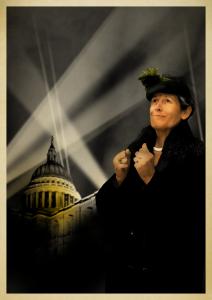
This one-woman show is written and performed by Alison Skilbeck. Using only a few key props, the play rests entirely on her performance as Eleanor Roosevelt.
The action opens with Eleanor as a frail and elderly lady in 1962, the year of her death. It is not long however before we are drawn back two decades earlier to October 1942 and Eleanor’s tour of Britain.
Eleanor is the audience’s eyes and ears as we journey with her through war torn London and the rest of the country. No detail is too small and Skilbeck’s delivery means that it is easy for the audience to visualise the meals at Buckingham Palace, the tour of London showing bomb-damaged St Pauls and the slums decimated by the nightly air raids. There are flashes of humour too and Skilbeck excels at taking on the other roles needed to tell Eleanor’s story. Look out for her voicing the Queen and the King’s Mother, Queen Mary.
As an audience member you have to concentrate as there is so much information being imparted, but don’t let this put you off. It is delivered with such enthusiasm and pathos that it doesn’t feel like an effort. I knew nothing about Eleanor Roosevelt before this show, but have come away wanting to know more. Sound effects and subtle lighting changes help segue the action from one place in time to another. We learn through flashback that Eleanor had a deeply tragic childhood losing both her Mother and her Father at a very young age before then losing her younger Brother some years later.
During the story we are introduced to a host of well known historical figures including Franklin D. Roosevelt, Winston Churchill, Ernest Bevan, Lord Woolston (Minister for Food) and General Eisenhower. Although we learn a great deal from her interactions with these figures it is Eleanor’s meetings with American troops; members of the Women’s Voluntary Service; Land Girls and people in the shelters that really give her story depth and humanity.
Eleanor’s story contains a lot of tragedy, but this performance also shows what an indomitable figure she was. The press pack were almost begging her to reschedule her appearances as they couldn’t physically keep up with her boundless energy and drive.
This play is multi layered and the audience is taken through a wide range of emotions while following Eleanor through her recollections. Throughout the play there are moments where Eleanor questions whether her wartime tour has been successful or not. Alison Kilbeck’s writing and performance is testament to the fact that it was and is a real tribute to the lady herself.
I would very much recommend that you see this show if you are able to.
April Irwin
NATURE KNOWS BEST - TicTac Theatre
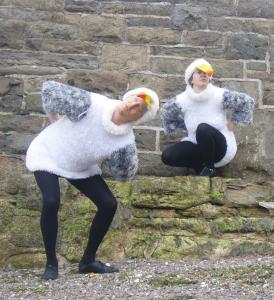
If you’ve ever wondered what animals have to say to each other then this is the show for you! Nature Knows Best is three consecutive tales of love and relationships as experienced by sheep, seagulls and a pair of devoted seahorses. That’s odd I hear you say…yes it is odd and all the more fun for it! The play is written by Devonshire playwright Nick Discombe and performed by the South West based Tic Tac Theatre company.
Hannah Brooks and Scott Goodair convincingly capture the voice and movements of the three different pairs of creatures. Vocally the animals are all distinct and really clearly defined. The physicality of the actors as they become the different creatures is fascinating to watch, the pair seems to be in almost perpetual motion as the seahorses especially, the sheep however are not so speedy!
Even the transitions between scenes are entertaining and the accompanying music is so much fun. The scenery itself is very simple but it quickly transforms into the different locations needed by a quick turn & reposition. I loved the idea for the seaweed…it was inspired. The costume changes are simple, effective and very funny (especially the seahorses).
The first night audience clearly enjoyed the show. Be warned though…just because the show has fluffy animal costumes in it, this piece is most definitely not for young children. Please make the trip out to The Community School drama studio, it’s only a five minute walk away from Pavilion Gardens, and you will most certainly experience an original perspective on relationships and the natural world.
Jayne Marling
NONSENSE & SENSIBILITY by Tom Crawshaw - Anonymous is a Woman and Three's Company
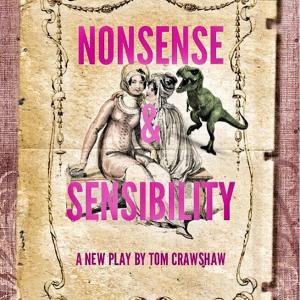
Emma (Leila Sykes) has a real passion for all things Austen and during her research for her Phd uncovers a long lost piece of work that she is eager to share with the audience supported by her less academic but no less enthusiastic friend, Harriet (Madeline Gould). With elements of a French and Saunders comedy act, Sykes plays the straight woman serious about her studies and never straying from the philosophy of the way Austin wrote, her life, her interests. Gould, on the other hand, is full of energy, charging around the stage enthusiastically throwing herself in to the roles, embracing the possibility that this could lead to a full blown production in Theatreland. Yet those who know Jane Austen’s work will recognise the language and prose and this pair are faithful to this throughout; her work is not mocked but celebrated.
With only a plastic dinosaur and a bag of licorice for props, the play follows the plot of Pride and Prejudice with other writing thrown in but also introduces us to Austin’s interest in fossils (and there are lots of references later on to dinosaurs! Oh and snakes!) It is very skilfully acted using different accents to highlight the many characters, all at rapid speed which leaves the actors and the audience quite breathless and also reeling with laughter.
It is such a jolly romp, actively enjoyed by the packed audience who are encouraged to participate and do so, quite willingly. There is a fleeting, quite serious moment when you realise that maybe there is an underlying message from Jane Austin that her writings and observations are all about friendship and not just the absurdities of marriage. It is also very funny and you cannot help but laugh at the brilliant writing which refers to a number of other, totally unrelated productions – sorry no spoilers on the plot. This was a sell out so book early for the second and final showing on Sunday 16th July, 7.00pm Old Clubhouse.
Audience comments included “amazing…so imaginative…very, very funny”
Sandra Cooper
ON BEHALF OF THE PEOPLE - The Melting Shop

On Behalf of the People is part of the National Coal Mining Museum’s exhibition to commemorate the nationalisation of the coal industry (which explains the title) and Ray Castleton was commissioned by them to write, in his words, a play about nationalisation. Fearing that this might test the attention-span of even the most devoted of theatre-goers, he wrote instead, in his first full-length play, a story based on the lives of real people between the years 1945 and 1953.
The play examines the lives of 4 members of a family when Tom (Adam Horvath) returns from the war to be reunited with his mother Connie (Kate Wood) and fiancée Lizzie (Lizzie Frain) as well as father George (Ray Ashcroft). He attempts to pick up from where he left off, not least by going back to the pit, but a lot has changed since he went away. A lot, too, is due to change, in the tumultuous and socially significant few years which herald the beginning of peace time.
The four actors give a very strong performance and, one imagines, represent types typical of the time and of their class. Perhaps the most striking is Ashcroft’s George, a dour, unemotional figure (‘stubborn as a mule’) who devotes his life to the union and the newly resurgent Labour Party (he uses a lot of words...), but can hardly look his son in the face on his return from the war. He is well matched by his headscarf-wearing wife Connie, (and I would not like to take bets on a head-to-head between them, especially when it comes to a discussion about pit-language), whose reaction to the filial return has more to with berating him for not writing home and for bringing an inappropriate gift (‘I can’t wear that!’) Tom is clearly overwhelmed to be reunited with his mother, arguably less so with his father, with whom he has a difficult relationship, partly for generation-related reasons, but there is more to it than that. This leaves the initially clandestine fiancée, Lizzie, loyally devoted to her returning Tom but at the same time a considerable force in herself who grows throughout the play. She, too, represents the new generation, which catches even her fiancé momentarily off-guard, and although she is initially wary, she gives as good as she gets in a lengthy altercation with George. Will she ever ‘know her place’? It is very doubtful. The tensions grow and grow, perhaps because the 4 main characters are so strong.
The play is very well written and treats themes such as how a society treats those who return from serving it, but despite moments of bleakness, not least about the way in which the masters of war exploit those who serve them, there is optimism for the future, particularly in the second half of the play. What I particularly liked about the writing is that there are subtle off-stage references which intrigue the audience as well as advance the plot – who is Dunn? What is the story about Lizzie’s family, and what about her other secret (which Connie has guessed, anyway)?
There are very poignant, moving moments, for example featuring Tom’s feelings of guilt and Connie’s regrets. A highlight is the former’s harrowing account of a war-related nightmare. The play has many resonances with the future, too, for example with the mid 80’s miners’ strike, even with the present day (The Mail is as it was, for example). There are lighter touches too, and oddly some are to be provided by the phlegmatic George, who for example never sleeps, he merely rests his eyes.
The direction by Charlie Kenber is imaginatively done, and the cast intermingle with the audience at the beginning and sit amongst them occasionally, still in character, which for me gave a Brechtian feel to the whole, in keeping with the theme of war being waged partly, at least, to exploit the masses. The many short scenes are punctuated by abrupt percussion, which in the first half at least, recalls gunfire.
The Melting Shop is a Yorkshire-based theatre company, directed here in the round by Charlie Kenber, who in the words of their website (themeltingshop.co.uk) deliver real stories that matter and aim to employ local actors. Sadly they are only at the Fringe for one night this year, although for the next 3 nights are keeping it local at Stocksbridge, Goldthorpe and Chesterfield. Let us hope they can return to a larger audience next year!
Ian Hamilton
PEER GYNT by Henrik Ibsen, adapted by Gruffdog Theatre - Gruffdog Theatre

There’s a moment in Willy Russell’s play, Educating Rita where, when challenged to write an essay on how one could stage Peer Gynt, Rita writes simply ‘Put it on the radio.’ Ibsen’s verse drama, charting the life of a dreamer from youth to old age, crossing continents, and meeting supernatural figures along the way, has proved simply too massive and unwieldy to be often attempted, and has become better known for Grieg’s incidental music than for the play itself.
Perversely it was apparently this impossibility which drew director Peter Sayer to Peer Gynt – and boy, has his gamble paid off. Gruffdog Theatre’s 10-strong company condense the play down to an hour and 10 minutes of pure joy, combining ensemble acting, movement, music and puppetry with total assurance. All the actors are dressed the same and, by the simple device of exchanging a cap, four of them (Joseph Stephenson, Daisy Hayes, Rory Grant and Tom Curzon) play Peer at different stages of his life, from cocky youth to despondent old age. There are no weak links in the 10-strong cast, it is ensemble playing of the highest order. This is a company who are totally in tune, musically and physically.
Music is an essential part of this show, setting mood, linking scenes, binding the cast together, and music director Gaetano Iannetta needs to be congratulated for mingling Norwegian folk songs, original material and Grieg’s most famous Gynt pieces, ‘Morning’ and ‘In the Hall of the Mountain King’ (as well as playing a delightfully sinister Button Molder).
This is an enchanting, enriching, entirely joyful production, which sent the audience away buzzing with excitement. It is simply wonderful.
Robbie Carnegie
PERILOUS TALES - LUNA C Productions
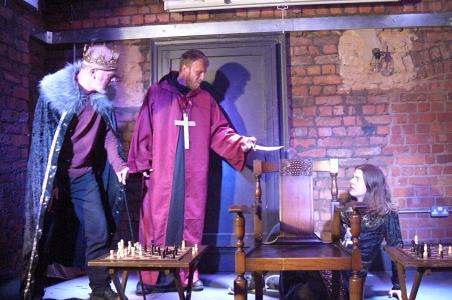
A bare stage, almost spartan; eight actors in all; three short plays, new writing. In the first, after the acting out of a battlefield nightmare, two soldiers (an officer and his batman) engage with what appears to be shell-shock just before what is said to be (weren’t so many of them?) the Last Big Push in 1918. We are shown the suffering officer and his calm, totally-in-charge, batman through a series of revelations which it would be unfair to record here. Plot-spoilers forbidden.
The second, “Captive”, has reflections of, say, Pinter’s “The Caretaker”, but with a stronger sense of physical violence … based around a woman whose delusions mislead both her and the audience. This play, too, has a twist at the end.
The third brings together three Princes of centuries ago, meeting on the battlefield and mimicking the impending battle for power with games of chess, mingling trickery, lies, apparent honesty, deceit – all the Machiavellian tropes as the three twist their positions and try to see through the others’.
Eager and committed performers who attack the three scripts, by Andrew Hudson, Cliff Heaton (who directed) and Dominic Merrick with great energy and enthusiasm.
Michael Quine
PERSUASION TRANSPOSED - Nonesuch Theatre Company
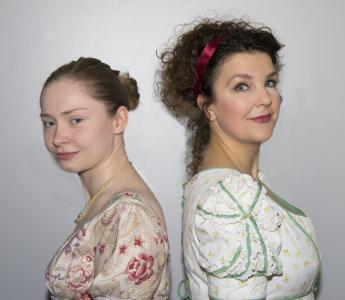
In this ‘romantic cocktail’ from Nonesuch Theatre Company, writer/director Ray Sutton takes the plot of Jane Austen’s Persuasion and frames it with the ingenious device of their being two actresses in the central role of Anne Elliot. The younger Anne (Rebekah McLoughlin), who was persuaded to throw over Captain Wentworth on account of his lack of social status, and the older Anne (Bekah Sloan) seemingly condemned to life as a lonely spinster, meet and discuss – in a modern style –their position, and the authorial voice of Jane Austen (‘that woman’) which has put them in this position.
At first it feels like we’re in for ‘Jane Austen meets Rosencrantz and Guildenstern Are Dead’ but having established this framing device, we then enter a fairly traditional retelling of the novel, albeit with occasional interjections from the modern Annes. The five-strong company are lively and unfussy in their performances, and this is a clean, clearly rendered production. The final coda, imagining what happened to the characters after the novel ended – the ‘messy stuff’ that Austen omits from her novels, strikes a surprisingly melancholy chord, which helps this show to live on the memory.
You also get an authentically Georgian rose-water biscuit on arrival!
Robbie Carnegie
PLAY TIME - Of Mice Theatre

Two 9-year-old schoolboys wait outside the teacher’s office, expecting punishment for a playground incident. One is serious, hard-working, goal-oriented (he wants to gain a place at the local academy). The other is a ‘bad influence’, encouraging his classmate to ‘dick around’ when things get stressful. This is the set-up for Of Mice Theatre’s Play Time, a comic exploration of childhood, seen through the prism of grown-ups. There’s a rich heritage for this kind of thing, whether Dennis Potter’s seminal Blue Remembered Hills or those creepy Haribo adverts when adults seem possessed by the spirits of children. Play Time is slightly different in that you have adults, playing children, but with the vocabulary of adults. Writer-performers Matt Zeqiri and Oliver Neck have a keen eye for the rituals of young boys, and in the games of one-upmanship they play, the dialogue set to accompany them reminded me of those old Fry and Laurie sketches which nailed boardroom politics so effectively. Occasionally Play Time attempts to have it all, bringing in audience interaction and passing remarks on technical issues to seek laughs more suitable to a stand-up show, which slightly takes away from the central conceit. That said, Play Time is a clever, amiable show, which as well as eliciting laughs, has some thoughtful points to make on the hothousing of youngsters as opposed to the advantages of play.
Robbie Carnegie
THE PRETTY ONE (AND OTHER THINGS THAT NEED TO BE SAID) - Cameryn Moore/Little Black Book Productions

This is the sort of show I go to the Fringe to see. It is a polished, thought provoking and intimate performance, throwing lights on subjects that are usually way off most people’s radar and even less frequently discussed.
In a one person play Cameryn Moore takes on a range of different characters and talks directly to the audience, in a style that reminiscent of the Alan Bennett television series Talking Heads, where repressed characters talk freely to the camera. Here, each piece tries to show the critical points in their lives that enabled them to move onwards towards something more positive.
All the pieces are set in America. One takes place outside a sex shop in New York. In another four couples are on their annual holiday in New Orleans. Some of the American references were unfamiliar, but the situations felt universal. I even found myself thinking some of these Americans are more repressed than us Brits! But I could relate to them, wherever they took place.
Cameryn performs in America and Europe and has been to the Fringe in Buxton before. But this work is different; this is a work that gets its power by being restrained. Unlike her autobiographical pieces, this play is fiction, whilst grounded in her own experience of people with problems. It may be no surprise that sexuality is a dominant theme, as well as love, relationships, fetishism, attraction and repression. Some of the pieces are sad, whilst others point towards an optimistic future.
Despite what you may know about Cameryn Moore, this is a show for all ages. Well, it probably isn’t going to make a lot of sense to anyone younger than 14, but the language shouldn’t upset anyone. If you are enjoying Love Island, then this is the alternative world of real people, with real bodies, living real lives, dealing with an imperfect hand.
I was disappointed when it ended, as I could happily have watched more.
You have three more chances to see it this year: July 8th, 11th and 17th. Go with a friend or partner and discuss afterwards!
Jonathan Davey
QUILTER AND THE GHOST - Arletty Theatre
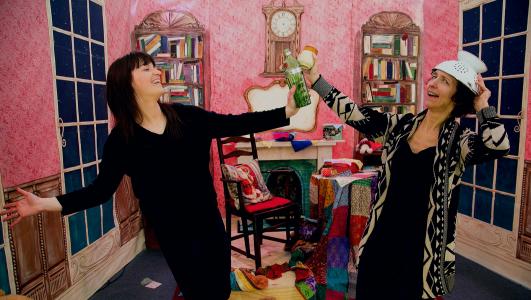
The motivation for this play was Arletty's Theatre's collection of stories about inspiring women which they incorporate into a never-ending patchwork quilt. The story's central character is the Quilter played by the author Imogen Joyce. In the past the Quilter has told her stories on a local radio show but now she is waiting to be evicted so that her house can be demolished to make room for a golf course. The other theme of the play is that the Quilter can sense ghosts and she talks to them about her past and present predicaments. The script weaves stories about inspiring women throughout history into its plot. It also introduces the ghosts that are part of the Quilter's life. To tell you any more would be to give away too many plot spoilers.
This is a very original three woman musical play. The songs are strong and enjoyable. I felt that the music was more in the style of the Threepenny Opera than traditional show tunes which is no bad thing. In fact if one of the actors has launched into a rendition of Pirate Jenny then it would have been in keeping with both the musical style and ethos of the play.
Imogen Joyce is excellent in the title role. She makes the Quilter completely believable expressing a combination of stubbornness, kindness and vulnerability and she has a beautiful voice that is perfect for musical theatre. Laura Mae Mellor and Emily Vinnicombe provide strong support. I felt that this was a play about strong women and strong emotions and the legacy that both of these things leave behind. It is about ghosts as well of course.
Alex Watts
SHAFTED - Marde Hen Productions
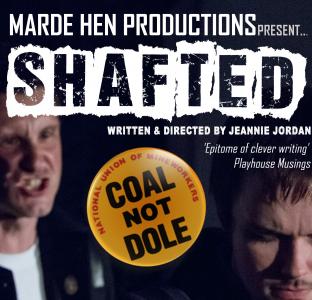
1985 – the miners’ strike in the UK which lasted for a year in all. This is the story of one family in the latter stages of the action which involved 142,000 mineworkers and caused havoc in their communities, and cost over 26 million working days. A strike for which there was never a national vote, and against which Margaret Thatcher as Prime Minister was able successfully to fight.
The play is book-ended by a present-day scene, as one striking miner returns home after 30 years for his mother’s funeral and to try to make peace with his father, a former pit deputy, but the majority of the action is around the strike, the anger within the mining community (”I’d rather be a striker than a scab”), the fundraising, the accusations of violence by the police ordered to help break the strike, and there are many many references to the strategies used by many of the players on both sides.
It’s not ‘the story of the strike’: though those of us who remember it will pick up the names, the politics, while those of a younger generation who have not studied the period will have found the storyline effective while probably missing a sense of the overall context – it’s there, but fragmented.
The play is obviously written and directed from the heart (by Jeannie Jordan) and some of the company of 9 actors have direct connections with the events of 30 years ago. The audience (older than for many Festival Fringe shows) were plainly at home with the narrative and found the piece evocative and compelling.
Michael Quine
STUCK - HOAX

Every Buxton Fringe needs a bit of genuine surrealism, something so out there that to some degree it defies description, and Hoax Theatre’s Stuck certainly fits that bill.
In a set that looks something between an undersea grotto and a landfill site, three female figures reside. They are basically human, and appear to have been taken from the archetypes of the Pagan goddess: one is childishly enthusiastic, with a tyre inner-tube for arms, one a yummy-mummy maternal figure with water carriers doubling for pendulous breasts; one an embittered older woman who hobbles around on two sticks. At intervals a drum sounds, causing them to fight over who will issue a weather report, and weather it will be a factual, doom-laden prediction of the ravages of climate change or a sunshine and rainbows upbeat version.
This is a show with enormous visual invention. As the situation worsens, the three women gradually cocoon themselves in carapaces fashioned from sleeping bags and outdoor wear, until any semblance of humanity gradually disappears, and they descend into a kind of invertebrate life form, like deep sea polyps or anemones, simply swaying with the tide.
The performances are full-blooded and committed, as they need to be and although there is much that is very, very strange (and on occasion, somewhat repellent) about this show, in the end there is a warm eco-heart to it which means that an audience is drawn in and grows to even like these strange, disturbing creatures.
Robbie Carnegie
SUPER HAMLET 64: PARODY DLC - Edward Day

Anyone who knows the basics of Hamlet, anyone who is familiar with early computer games, anyone who appreciates aspects of Lecoq-style mime … anyone who is any one of these will find much to appreciate in this entertaining and intelligent interlocking mixture of them all. You don’t by any means need them all, but one at least will help you make sense of this one-man show.
At times endearing, at times frustrating because – like Hamlet – he won’t or can’t make up his mind (“to be or not to be”, to do something or not to do it – and if so, then what?), the game itself and the actor challenge us to recognise dilemma and deal with it. Frustrating, the game, until we/he pass the initial hurdles and barriers. There is, for instance, a delightful scene where the performer, as Hamlet, is unable to move on in the game because his speech is unintelligible (to the game, not to us), then allows him the reward of fast progress up the levels as it in turn recognises irony, alliteration, repetition, euphemism, allusion, metaphor and others in the text extracts he speaks.
Edward Day, a multi-talented actor, created the show and performs. Visually, it’s simple – or is it? There’s a screen in front of which he performs, but it’s no ordinary screen, made up as it is of separate independent pieces shaped as those irregular fragments which fall down the screen in some computer games; and used to show, independently, fragments of the old-style computer game – images, instructions, reports, which flash up for long enough for us to take in. Sometimes Day emulates the character on the screen (or is it the other way round?) with Lecoq-style: sometimes he reacts or talks against it.
Overall, it’s plain that he is a devotee of screen games, well up in his Hamlet and Shakespeare (yes, he does borrow a few lines from other texts), and a talented performer and musician. It’s not Shakespeare as you know it: it’s not a computer game for the audience to interact with: and it’s persuasively and accurately described on the show’s website:
“Gamers love the gaming jokes: Shakespeare lovers adore the Shakespeare jokes: and non-games enjoy the mix of video-projection, physical comedy and spoken word.” Dead right.
Michael Quine
A TEACHER'S GUIDE TO SURVIVING ZOMBIE ARMAGEDDON - The Zombie Teacher
What a thoroughly entertaining one woman show this turned out to be. Rachel Tudor, a teacher with six years’ primary experience took the audience and the surviving members of her year three class on a remarkable journey.
It all started calmly enough with a teacher marking her books, taking the occasional sip from her fully insulated lidded cup. Pens and lolly sticks were all neatly in their respective pots and the whiteboard had the date, neatly written at the top. Then, Natasha, the new girl, “a biter” joined the class and things were never quite the same again.
The content was excellent and well informed both on a school and a zombie level. It will resonate with any primary teacher in constant fear of the dreaded OFSTED inspection. All the small touches such as students placing themselves on amber for misbehaviour and how the children answer the morning register were well observed. If you are a teacher then you will love the pain of the different coloured pens for marking and the fact that learning must take place no matter what is happening around you, even if that something is a zombie Armageddon.
The performance, on the whole, was good, but did lack definition between the different character voices. It would have been so much better if Lilly, the 7 year old self-professed zombie expert, had her own voice and not just a generic child voice indistinguishable from the other children. More comedy could be had from each child being treated as a real individual.
I feel the story itself was a triumph! Told with warmth and a real, in depth understanding of seven year olds and zombies! If you want to see an entertaining, good fun piece of drama then this is it.
Jayne Marling
THE UNKNOWN SOLDIER - Grist To The Mill Productions Ltd
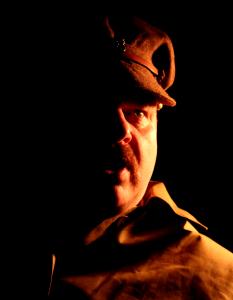
The Unknown Soldier is a one man show in the style of Alan Bennet's Talking Heads. Like those plays, the Unknown Soldier is an intimate portrayal of a person. Like those plays it draws the audience into that person's story. In this case it is a man who has survived the Great War and who is describing his memories, his fallen comrades and his experiences in the aftermath of the war. The superb script written by the performer (Ross Ericson) is a very original perspective on the familiar World War One narrative as well as a less familiar examination of the multi-culturalism of the British forces, the events of the last hours of the war and the post-war government propaganda. Both the script and the performance are completely believable and bring to life both the central character and the people he is describing. As the play develops, the audience can see that there is a twist coming but the person on stage is interesting and likeable we are happy to spend our time in his company and wait for the story to unfold.
This was one of the first Fringe performances of 2017 and Ross Ericson dramatic performance has set the acting bar very high for the other Fringe actors. It is the sort of quality acting performance that would not be amiss at the RSC or National Theatre.
Alex Watts
VINCENT RIVER by Philip Ridley - Sudden Impulse Theatre Company

Held at the Underground Old Clubhouse venue, there was a brilliant privacy to the performance of Vincent River; the random and close arrangement of assorted bar chairs allowed for full immersion and brought an almost intrusive intimacy to the piece. It truly felt as though I’d stumbled into someone’s living room, echoing the actions of our male character Davey (not David, as you may be forgiven for thinking). You would also be forgiven for thinking a play with only two actors, a single set and minimal props would be boring, but you would be proved wrong. For me it was the borderline mundanity of the piece that created its realism and believability. Although the Cockney accents and colloquial language were an interesting addition, as well as the talent of the actors, it was the lack of expected theatrical license and hyperbole that made this play so harrowing. Death, so often dramatised as affecting everyone and everything, is portrayed in the piece as something dealt with in the corners of kitchens and with gin in teacups, much as it is in reality. It seemed to also be a statement regarding the nature of Vincent’s death. I was forced to ask if the lack of any mass reaction was meant to reflect the attitude of the public to hate crime; as a society do we, even unknowingly so, care less about the deaths of minorities? In this respect the piece had a lasting and moral purpose, as an audience we are forced to think about the society we live in, and whether it has actually progressed in the 17 years since the play was written.
In periods of long speech, there seemed to be a drift into the language of the poetic; repetition of the running motif of snow created an atmosphere that was almost whimsical and the Oscar Wildesque, bordering on lyrical, dialogue suggests a romance as well as the seriousness needed to deal with such a sombre topic. Sexual tension between River’s mother and Davey permeates the whole performance, climaxing with an unexpected and slightly unnecessary kiss. It was this low hanging threat of great emotion, whether it be love or anger, erupting at various points with screams of expletives and warranted rage, which caused the audience to feel the same fear and paranoia anyone of the LGBTQ community may feel. The play was imbued by atmosphere; there was a deep sadness as well as an anger in the air.
The homophobic views expressed throughout the play are now hopefully viewed as almost archaic however they were widespread in 2000 (when the piece was originally written), and because I was only born in 2000 they were quite shocking. As a whole I think the piece has a deeply profound message and one that, despite the fact it may not seem as relevant now as 15 years ago, remains necessary to hear. We are shown the raw complexity and emotion of non- hetero relationships; they are to be viewed in the same way and with the same weight as straight relationships. We are also shown the deep homophobia and the violence and anger it causes - our character’s own struggles with accepting himself and being accepted by others, a mother’s grief is tainted by the prospect her son was gay - and we must realise how wrong this is in the modern age. I would recommend Vincent River to anyone prepared to deal with the raw and unadulterated emotion the play contains; allow yourself to eavesdrop on a single day in the East End and see what you learn.
Anna O'Boyle
WAITING FOR GANDALF - Chris Neville-Smith

I’d like to say this is a hidden gem but it already comes garlanded with praise from other fringe festivals. Rightly so.
Solo performer Chris Neville-Smith demands your attention from the moment he staggers onto the stage as Tolkein uber - nerd Kevin. In a performance ridden with tics and half-remembered, half buried slices from his past Kevin draws us into his increasingly darkening world. It’s a wonderfully seductive performance of a humorous and scathingly honest script by Adrian Marks that leads you down one path whilst always hinting that another lies in wait.
Kevin is first in line to have his Lord of the Rings book-of-the-movie signed by Gandalf – a major coup for a Ringer like him (true follower) and he draws his imaginary audience, and us, into his tale like a hoodied, MP3 carrying Ancient Mariner.
But beneath a slowly thinning veneer, his real story is fighting its way out of him and it’s both shocking and seemingly cathartic as Kevin faces his past and sheds his burden in a denouement that is stunningly moving.
To say any more would be in danger of spoiling this terrifically intimate little show that deals with big topics and I would urge any potential audience members to not allow this gem to remain hidden in Buxton – this could literally be the final chance to catch Chris as Kevin. See it.
David Hanson
WATCH THIS. LOVE ME. IT'S DEEP by Nathan Cassidy - The Rat Pack Productions Ltd/Nathan Cassidy
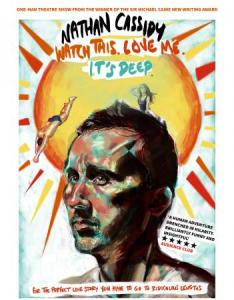
Nathan Cassidy is an award winning stand-up comedian and writer (Sir Michael Caine Award for New Writing: Buxton Fringe best comedy, etc) and had a string of sell-out performances for his last show “The Man in the Arena”. This one-man show is a cross between stand-up, confessional, home-spun philosophy, psychological commentary and advice, and David Sedaris-style narrative.
Using a pack of Tarot cards, one by one, he unreels a narrative which aims to show how a person’s life is or can be determined by the luck of the draw, the turn of the cards, and the way you interpret what you see.
It’s chuckle humour, “that’s a great line” writing, rather than laugh-out-loud material, and he comes across as persuasive and self-confident through the character he creates, explaining a continuous narrative through the warm, strong and loving relationship with his partner up to the point where for the audience he breaks the spell he’s created. The tarot cards serve well to illustrate the line of the script, and he closes the show very neatly by using the first few of a pack of ordinary cards to suggest again that life is – or may be – what you make of it.
Michael Quine
WE LOST ELIJAH - Shadow Syndicate

Towards the end of this powerful and strikingly delivered play, Becky, played by Alissia Di-Cosmo , attempts a bathetic poem in which she invokes Homer’s thoughts along the lines that night is a woman. I am not sure, but I do remember from my schooldays that girls tended to be smarter and more streetwise than their male counterparts, and this stunning performance did little to dispel that rather simplistic view.
‘We Lost Elijah’ is influenced by the real-life disappearance of a young person during riots in London and examines themes such as youth identity, celebrity and the role of the media. Malachi was charged with getting Elijah home safely through the riots, but something somehow went wrong. The tense drama follows the course of events and the ensuing twists and turns.
The action begins with the seven of the cast addressing the disappearance, the main players being Malachi (Ethan Lewis), by turns a guilt-ridden and charismatic figure and Grace (Irene Ebeye) a jealously angry figure with considerable authority, while her sister Kara (Kheeva Cheema) presides as narrator. Soon we encounter Elijah (Alex Doran), an everyday irritant, by all accounts, as well as a suicidal diary-reader. Becky (Alissia Di-Cosmo) is the flirtatious, playing hard to get object of his desires. What could possibly go wrong?
Quite a bit, as it happens, but that would be telling. It is enough to say that the girls outwit and out-manoeuvre the boys at every turn, none more so than Grace, who soon emerges as the star of the show. Witty, sarcastic, thoroughly manipulative, scheming and controlling, she is expertly portrayed by Irene Ebeye. The jauntily-hat-wearing Becky, archetypical popular girl, gives her a run for her money, however. Neither Elijah nor Malachi stand much of a chance.
The tone of the play is at times dark but also humorous – Grace describes herself as making herself just too desirable, while the afore-mentioned popular girl invites her suitor (an irrelevance) to ‘carry on stalking me’. Elijah, it turns out, is ‘a bit busy committing suicide’. Meanwhile there is a humorous rap performed by Maxwell and Titus (Joe Deane and Will Mulcahy) which deserves rather more than the contemptuous reaction from Grace – but what an expression!
Without giving too much away, the end of the play is a shock. Kara states that everyone owes a share of the collective guilt (although that is rather harsh on Seanie )
The dialogue and delivery ring true, as do the gestures and attitudes struck by the young people. In this respect I was particularly struck by Isabel Milner but all the young actors were most convincing. The sparse set (milk trays? A stool?) and stylised scenes of violence, as well as miming (eating, drinking, smoking…) create an eery, other-wordly effect, enhanced at times by ambient music.
These young actors from The Becket School in Nottingham have a bright future ahead of them, and I recommend that you catch this intriguing show, which you can do on the 17th and 18th of July.
Ian Hamilton
WHATEVER HAPPENED TO BRIAN? - Dolls House

I’m still unsure after watching this performance – was it euthanasia? Was he cryogenically frozen, or was it the fault of the various “loony” women in his life who allegedly left him in a coma, from which he was only to be revived by the audience making the noise of trains. There were songs to accompany all of these topics, and the works of appositely named Sounds Bizarre at least added clarity into the mind of our writer Alan Charnley. Whilst on the band’s brilliance, husband and wife duo Cage of Crows provided a strong backdrop to the whole piece and Niki Adlam Stiles’ voice and electric blue wig really enhanced the performance.
As a venue the Green Man Gallery was very apt, the quirky and interesting atmosphere it provided fitted perfectly to the performance. Be prepared to hear every single wavering and bizarre note of Brian Blatherwick’s voice, it is impossible not to, thanks to the very relaxed and homely seating arrangement. Chairs positioned around small bar tables gave a very comfortable feel and the various drinks available at the bar and crisps on the tables were much appreciated.
If you like audience participation, uniforms, whips, faux rock opera and a smattering of corny jokes, then this is the production for you. Sarah Gordon successfully demonstrates a variety of accents in roles including Brian’s dominatrix mother, freedom fighter girlfriend Laura (who the best song of the evening was about) as well as Brummie platform attendee and sex addict girlfriend Delia Bonnyface.
We then have Tina King of Peter Kay’s Car Share infamy, who acts as the much needed narrator as well as “loony” girlfriend no. 2, who, dressed in slightly disturbing school girl style, complete with lollipop, shrinks or buries in the garden (I wasn’t entirely sure) people she doesn’t like. Her final and most successful role came in the form of “Scottish” psychiatrist Margarita Upshott, whose job it was to “cure” Brian of his unknown ailment.
As clearly demonstrated by this performance, the Buxton Fringe provides a platform for unique and individual perspectives. With the show billed as an Alan Ayckbourn and Rocky Horror mix, you would be forgiven for thinking you are in a “Timewarp”, or maybe it’s just Buxton...
Anna O'Boyle



